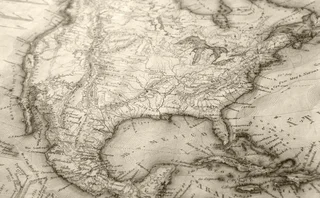West Lothian Looks Simple Now

In British political science, the so-called West Lothian question refers to the ability of Members of Parliament (MPs) from Northern Ireland, Scotland and Wales to vote on matters that affect only England. It's been a perennial question in Union politics since it crystallized into this concept in 1977, but the events this week in Scotland will make that thorny constitutional issue look like a child's mathematical problem, in comparison to the question Scotland faces.
For those who have been living under a rock all year, on Thursday the people of Scotland will be asked to answer a question in a referendum: "Should Scotland be an independent country?" Six words that, on their own, are rather simple, but put together in this combination have the ability to break apart a union of countries that has existed for over 300 years.
It's not the place of this column to discuss the whys and wherefores, the pros and cons, the benefits and drawbacks of Scottish independence. I have friends who sit in both camps, some of whom are actively involved in campaigning for both sides. I have strong Scottish roots in my family, and my own opinions on the independence debate, which I'll choose to keep private here.
It does highlight the perils of geopolitical risk, though, an area which is often ignored in developed nations such as the United Kingdom. Secession is more for the unstable Baltics, the war-torn Middle East, or the African continent, most people say, not an advanced Northern European democracy. But the implications of Scotland breaking away from the UK will be tremendous.
Capital Flight
Most banks have already indicated, or outright confirmed, that they will shift any Scottish headquarters to London in the event of independence, even the Royal Bank of Scotland. Officials from the European Union, the International Monetary Fund, and, God save them, Quebec, have posited differing views of the ramifications of a "yes" vote on September 18. Questions remain over what currency an independent Scotland would use ─ whether Westminster backs down and allows a currency union, or whether the Scottish Treasury instigates a process of "sterlingization", with all of the consequences that brings. Social concerns around citizenship, how porous a border would be, and whether or not Scotland will be able to join the EU ─ ideally with the UK's negotiated exemptions from the single currency and the Schengen agreement intact ─ are also conversant. If Scotland chooses to walk away from its share of UK national debt, too, will that count as a default event on the very first minute of the very first hour of the new country?
All of these present vast challenges for the markets, as well as for Scotland. Everything, from pricing instruments, through to connectivity, identifiers, risk management and hedging, general technology, compliance and organizational structures will have to be revitalized and reformed, depending on what the outcome of negotiations between Holyrood and Westminster will be. Even in the event of a "no" vote, if the result is close enough, as all polls currently indicate, there remains the enhanced risk of this happening again in 10 years' time, introducing fresh anxiety and contingency plans.
At the end of the day, though, these are issues that can be worked through, regardless of the eventual results. What matters is that the vote is genuine on the part of those able to cast it, without bias to fearmongering on either side, whether that be proselityzing from apocalyptic unionist prophets, or utopian daydreaming from the nationalists. Nationhood, like economics, like politics, like life, in the esteemed words of Jeff Goldblum, finds a way.
Only users who have a paid subscription or are part of a corporate subscription are able to print or copy content.
To access these options, along with all other subscription benefits, please contact info@waterstechnology.com or view our subscription options here: http://subscriptions.waterstechnology.com/subscribe
You are currently unable to print this content. Please contact info@waterstechnology.com to find out more.
You are currently unable to copy this content. Please contact info@waterstechnology.com to find out more.
Copyright Infopro Digital Limited. All rights reserved.
As outlined in our terms and conditions, https://www.infopro-digital.com/terms-and-conditions/subscriptions/ (point 2.4), printing is limited to a single copy.
If you would like to purchase additional rights please email info@waterstechnology.com
Copyright Infopro Digital Limited. All rights reserved.
You may share this content using our article tools. As outlined in our terms and conditions, https://www.infopro-digital.com/terms-and-conditions/subscriptions/ (clause 2.4), an Authorised User may only make one copy of the materials for their own personal use. You must also comply with the restrictions in clause 2.5.
If you would like to purchase additional rights please email info@waterstechnology.com
More on Trading Tech
FCA sets up shop in US, asset managers collab, M&A heats up, and more
The Waters Cooler: Nasdaq and Bruce ATS partner for overnight market data, Osttra gets sold to KKR, and the SEC takes on DOGE in this week’s news roundup.
EMS vendors address FX options workflow bottlenecks
Volatility is driving more buy-side interest in automating exercises and allocations.
BNP Paribas explores GenAI for securities services business
The bank recently released a new web app for its client portal to modernize its tech stack.
Treasury selloff challenges back-office systems, datafeeds
FIS and Trading Technologies suffered downtime during peak activity.
Coming to America: Deutsche Börse targets US market using SimCorp One
Fresh from integrating SimCorp and rearranging its business lines, the German exchange has set American expansion as its goal for SimCorp’s buy-side offering.
Tariffs, data spikes, and having a ‘reasonable level of paranoia’
History doesn’t repeat itself, but it rhymes. Covid brought a “new normal” and a multitude of lessons that markets—and people—are still learning. New tariffs and global economic uncertainty mean it’s time to apply them, ready or not.
ICE eyes year-end launch for Treasury clearing service
Third entrant expects Q2 comment period for new access models that address ‘done-away’ accounting hurdle
MarketAxess, S&P partnership aims for greater transparency in fixed income
CP+, MarketAxess’s AI-powered pricing engine, will receive an influx of new datasets, while S&P Global Market Intelligence integrates the tool into its suite of bond-pricing solutions.







